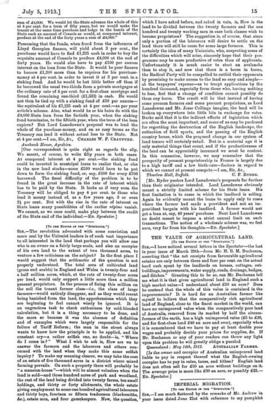THE VALUE OF AGRICULTURAL LAND.
[To THE EDITOR 07 TUE "SPECTATOR."]
have noticed several letters in the Spectator—the last in your issue of March 29th—from Mr. H. B. M. Buchanan. asserting that "the net receipts from favourable agricultural estates are only between three and four per cent. on the actual hard cash spent by the landlords on houses, cottages, out- buildings, improvements, water supply, roads, drainage, hedges, and ditches." Granting this to be so, can Mr. Buchanan tell me what it is that gives agricultural land in England such a high market value—I understand about £50 an acre? Does he contend that the whole of this value is contained in the improvements ? It is hard for an Australian farmer like myself to believe that the comparatively rich agricultural land of England, close to the finest market in the world, can have no unimproved value when the comparatively poor land of Australia, removed from its market by half the circum- ference of the earth, has a high unimproved value (25 to £20, and for first-class land £40 an acre and over), especially when it is remembered that we have to pay at least double your wages and probably double your prices for supplies, &c. If Mr. Buchanan or any of your readers can throw any light upon this problem he will greatly oblige a puzzled
Queensland : May 14th, 1913. AUSTRALIAN FARMER.
[Is the owner and occupier of Australian unimproved land liable to pay in respect thereof what the English-owning occupier has to pay in rates, taxes, and tithes ? English land does not often sell for £50 an acre without buildings on it. The average price is more like £30 an acre, or possibly £25.— ED. Spectator.]


















































 Previous page
Previous page